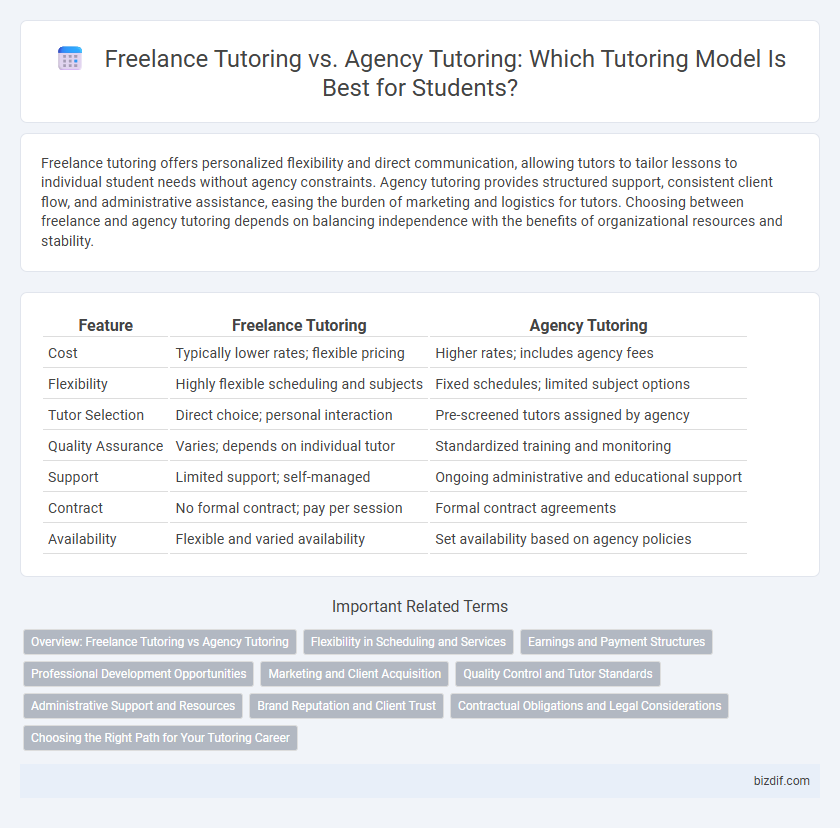Freelance tutoring offers personalized flexibility and direct communication, allowing tutors to tailor lessons to individual student needs without agency constraints. Agency tutoring provides structured support, consistent client flow, and administrative assistance, easing the burden of marketing and logistics for tutors. Choosing between freelance and agency tutoring depends on balancing independence with the benefits of organizational resources and stability.
Table of Comparison
| Feature | Freelance Tutoring | Agency Tutoring |
|---|---|---|
| Cost | Typically lower rates; flexible pricing | Higher rates; includes agency fees |
| Flexibility | Highly flexible scheduling and subjects | Fixed schedules; limited subject options |
| Tutor Selection | Direct choice; personal interaction | Pre-screened tutors assigned by agency |
| Quality Assurance | Varies; depends on individual tutor | Standardized training and monitoring |
| Support | Limited support; self-managed | Ongoing administrative and educational support |
| Contract | No formal contract; pay per session | Formal contract agreements |
| Availability | Flexible and varied availability | Set availability based on agency policies |
Overview: Freelance Tutoring vs Agency Tutoring
Freelance tutoring offers personalized lesson plans and flexible scheduling tailored to individual student needs, while agency tutoring provides structured programs with vetted professionals and administrative support. Agencies often handle marketing, client matching, and payment processing, reducing the tutor's administrative burden. Freelancers benefit from direct client relationships and higher income potential but must manage their own business operations and client acquisition.
Flexibility in Scheduling and Services
Freelance tutoring offers greater flexibility in scheduling, allowing tutors and students to arrange sessions that fit their individual calendars without strict constraints. Agency tutoring often provides structured schedules and standardized services, which may limit personalization but ensures consistent availability and professional oversight. Choosing between freelance and agency tutoring depends on the need for adaptable timing and customized educational support versus a more regulated and reliable framework.
Earnings and Payment Structures
Freelance tutoring often offers higher earning potential per session as tutors set their own rates and retain full payment from clients, though they bear the responsibility of finding and managing clients. Agency tutoring typically provides lower per-session pay since agencies take a commission or fee, but it ensures a steady flow of students and handles administrative tasks like payment collection. Tutors must weigh the trade-off between autonomy and workload when choosing between freelance and agency tutoring payment structures.
Professional Development Opportunities
Freelance tutoring offers personalized professional development opportunities through direct client feedback and flexible scheduling, enabling tutors to tailor their teaching methods and expand subject expertise independently. In contrast, agency tutoring provides structured training programs, mentorship, and access to a network of experienced educators, fostering skill growth within a collaborative environment. Professional development through agencies often includes certifications and workshops that enhance credibility and career advancement potential.
Marketing and Client Acquisition
Freelance tutoring relies heavily on personal branding and word-of-mouth marketing to attract clients, often leveraging social media platforms and local community networks for direct outreach. Agency tutoring benefits from established marketing channels and a broader client base through professional advertising campaigns and partnerships, which streamline client acquisition. While freelancers invest in personalized marketing strategies to build trust, agencies utilize scalable systems and brand recognition to secure a steady influx of students.
Quality Control and Tutor Standards
Freelance tutoring often lacks standardized quality control, making it essential for students to verify tutor credentials and reviews independently. Agency tutoring provides structured oversight with consistent vetting processes, ensuring tutors meet specific qualifications and performance benchmarks. This systematic approach enhances reliability and maintains higher tutor standards across the board.
Administrative Support and Resources
Freelance tutoring offers flexibility but often requires tutors to manage their own administrative tasks such as scheduling, invoicing, and marketing, which can be time-consuming and detract from teaching focus. Agency tutoring provides robust administrative support, including streamlined scheduling, payment processing, and access to educational resources, allowing tutors to concentrate solely on instruction. Access to centralized digital platforms and curriculum materials through agencies enhances efficiency and ensures consistent quality in tutoring services.
Brand Reputation and Client Trust
Freelance tutoring offers personalized one-on-one engagement, allowing tutors to build a strong personal brand and foster direct trust with clients through consistent, tailored results. In contrast, agency tutoring benefits from an established brand reputation, providing clients with a sense of reliability and quality assurance due to standardized vetting processes and professional oversight. Clients often prefer agencies for the security of managed services, while freelancers attract those seeking customized support and transparent communication.
Contractual Obligations and Legal Considerations
Freelance tutoring involves direct contractual agreements with clients, offering flexibility but requiring tutors to manage their own legal responsibilities, such as liability insurance and tax compliance. Agency tutoring typically includes standardized contracts where the agency handles legal obligations, providing tutors with a layer of protection but less control over terms. Understanding differences in contract terms, confidentiality clauses, and liability coverage is crucial for tutors when choosing between freelance and agency arrangements.
Choosing the Right Path for Your Tutoring Career
Freelance tutoring offers flexible scheduling and personalized client selection, enabling tutors to set their rates and develop a unique teaching brand. Agency tutoring provides consistent student referrals, administrative support, and steady income, but may involve fixed rates and less autonomy. Evaluating personal priorities such as independence, income stability, and workload management is essential when choosing the right path for a successful tutoring career.
Freelance Tutoring vs Agency Tutoring Infographic

 bizdif.com
bizdif.com